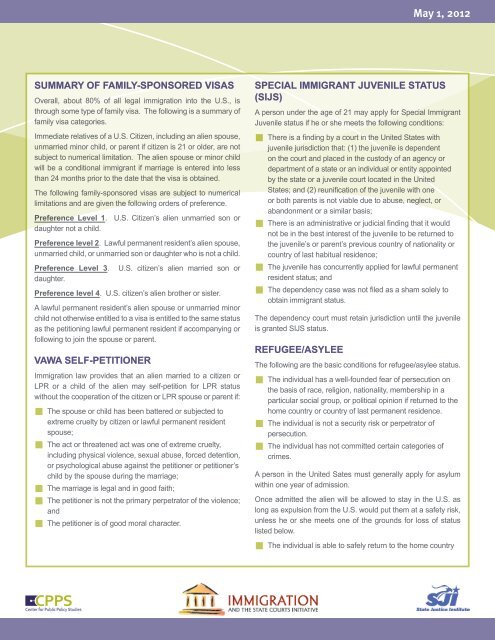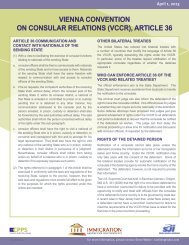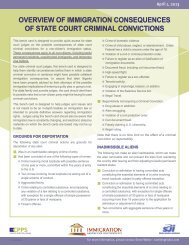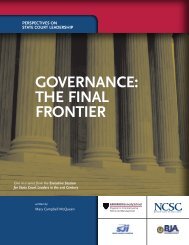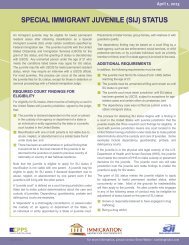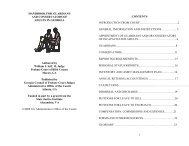Overview of Types of Immigration Status - State Justice Institute
Overview of Types of Immigration Status - State Justice Institute
Overview of Types of Immigration Status - State Justice Institute
Create successful ePaper yourself
Turn your PDF publications into a flip-book with our unique Google optimized e-Paper software.
DRAFT<br />
May 1, 2012<br />
SUMMARY OF FAMILY-SPONSORED VISAS<br />
Overall, about 80% <strong>of</strong> all legal immigration into the U.S., is<br />
through some type <strong>of</strong> family visa. The following is a summary <strong>of</strong><br />
family visa categories.<br />
Immediate relatives <strong>of</strong> a U.S. Citizen, including an alien spouse,<br />
unmarried minor child, or parent if citizen is 21 or older, are not<br />
subject to numerical limitation. The alien spouse or minor child<br />
will be a conditional immigrant if marriage is entered into less<br />
than 24 months prior to the date that the visa is obtained.<br />
The following family-sponsored visas are subject to numerical<br />
limitations and are given the following orders <strong>of</strong> preference.<br />
Preference Level 1. U.S. Citizen’s alien unmarried son or<br />
daughter not a child.<br />
Preference level 2. Lawful permanent resident’s alien spouse,<br />
unmarried child, or unmarried son or daughter who is not a child.<br />
Preference Level 3. U.S. citizen’s alien married son or<br />
daughter.<br />
Preference level 4. U.S. citizen’s alien brother or sister.<br />
A lawful permanent resident’s alien spouse or unmarried minor<br />
child not otherwise entitled to a visa is entitled to the same status<br />
as the petitioning lawful permanent resident if accompanying or<br />
following to join the spouse or parent.<br />
VAWA SELF-PETITIONER<br />
<strong>Immigration</strong> law provides that an alien married to a citizen or<br />
LPR or a child <strong>of</strong> the alien may self-petition for LPR status<br />
without the cooperation <strong>of</strong> the citizen or LPR spouse or parent if:<br />
QQ<br />
The spouse or child has been battered or subjected to<br />
extreme cruelty by citizen or lawful permanent resident<br />
spouse;<br />
QQ<br />
The act or threatened act was one <strong>of</strong> extreme cruelty,<br />
including physical violence, sexual abuse, forced detention,<br />
or psychological abuse against the petitioner or petitioner’s<br />
child by the spouse during the marriage;<br />
QQ<br />
The marriage is legal and in good faith;<br />
QQ<br />
The petitioner is not the primary perpetrator <strong>of</strong> the violence;<br />
and<br />
QQ<br />
The petitioner is <strong>of</strong> good moral character.<br />
SPECIAL IMMIGRANT JUVENILE STATUS<br />
(SIJS)<br />
A person under the age <strong>of</strong> 21 may apply for Special Immigrant<br />
Juvenile status if he or she meets the following conditions:<br />
QQ<br />
There is a finding by a court in the United <strong>State</strong>s with<br />
juvenile jurisdiction that: (1) the juvenile is dependent<br />
on the court and placed in the custody <strong>of</strong> an agency or<br />
department <strong>of</strong> a state or an individual or entity appointed<br />
by the state or a juvenile court located in the United<br />
<strong>State</strong>s; and (2) reunification <strong>of</strong> the juvenile with one<br />
or both parents is not viable due to abuse, neglect, or<br />
abandonment or a similar basis;<br />
QQ<br />
There is an administrative or judicial finding that it would<br />
not be in the best interest <strong>of</strong> the juvenile to be returned to<br />
the juvenile’s or parent’s previous country <strong>of</strong> nationality or<br />
country <strong>of</strong> last habitual residence;<br />
QQ<br />
The juvenile has concurrently applied for lawful permanent<br />
resident status; and<br />
QQ<br />
The dependency case was not filed as a sham solely to<br />
obtain immigrant status.<br />
The dependency court must retain jurisdiction until the juvenile<br />
is granted SIJS status.<br />
REFUGEE/ASYLEE<br />
The following are the basic conditions for refugee/asylee status.<br />
QQ<br />
The individual has a well-founded fear <strong>of</strong> persecution on<br />
the basis <strong>of</strong> race, religion, nationality, membership in a<br />
particular social group, or political opinion if returned to the<br />
home country or country <strong>of</strong> last permanent residence.<br />
QQ<br />
The individual is not a security risk or perpetrator <strong>of</strong><br />
persecution.<br />
QQ<br />
The individual has not committed certain categories <strong>of</strong><br />
crimes.<br />
A person in the United Sates must generally apply for asylum<br />
within one year <strong>of</strong> admission.<br />
Once admitted the alien will be allowed to stay in the U.S. as<br />
long as expulsion from the U.S. would put them at a safety risk,<br />
unless he or she meets one <strong>of</strong> the grounds for loss <strong>of</strong> status<br />
listed below.<br />
QQ<br />
The individual is able to safely return to the home country


